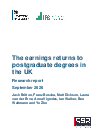Large variation in earnings returns among postgraduate degrees

Postgraduate degrees offer better labour market returns for women, with returns of more than 15% for masters in business and law, but negative returns for many arts and humanities courses
New “Earnings returns to postgraduate degrees in the UK” report published today (16 Sept) by @TheIFS and @EducationGovUK provides new evidence on the selection into postgraduate courses and the earnings outcomes for those courses.
Women with a masters degree earn considerably more at age 35 than those with only an undergraduate degree, with average earnings of £35,400, compared with £32,500 for those who do not go beyond undergraduate level. For men, the differences are even larger: masters graduates earn £55,800 on average, £5,000 more than those with only an undergraduate degree.
Most of these earnings differences can be accounted for by masters graduates coming from better-off backgrounds, and having higher prior attainment, than those who do not pursue postgraduate qualifications. Compared with otherwise-similar individuals who don’t go beyond undergraduate level, by age 35 women with a masters degree earn 2% more and men 2% less.
PhD graduates also earn more at age 35 than those with an undergraduate degree only, with average earnings of £36,000 for women and £51,900 for men. When we compare individuals with the same prior attainment and background, women with PhDs still earn 8% more at age 35 than otherwise-similar women without a postgraduate qualification, but men with PhDs earn 9% less than their less-well-qualified peers. Having a PhD, though, provides some certainty of at least reasonable earnings. Very few end up unemployed or on low earnings.
Postgraduate Certificate of Education (PGCE) graduates have average earnings of £38,100 for men and £28,800 for women, less than for those with an undergraduate degree only. Once we account for the differences in prior attainment – in particular, PGCE graduates having taken lower-earning undergraduate subjects on average – we find that PGCEs reduce the earnings of graduate men at age 35 by 2% and increase those of women by 1%. Like PhDs, they do protect against bad labour market outcomes.
These averages mask important variation by subject and by prior undergraduate degree. Masters in business, economics and law have returns upwards of 10% for both men and women. On the other hand, a few arts and humanities masters courses are associated with men earning more than 20% less than similar individuals without a postgraduate degree.
Having done an arts degree, ‘doubling down’ by going on to a further degree in the same field seems to result in large negative returns. For those with relatively low-returning undergraduate qualifications (e.g. in arts or humanities), PGCEs and masters in business, law or economics offer very good returns, assuming they can be accessed.
For students with an undergraduate degree in economics, law and many science subjects, PGCEs reduce earnings by more than 10%. English, sports science and creative arts graduates see large positive returns to taking a PGCE. These patterns may help to explain the difficulties in recruiting teachers in these high-priority areas. While the result is intuitively obvious, the findings here are useful in providing concrete evidence to support that intuition.
There are large differences in access to postgraduate degrees by parental background. Virtually all of this participation gap can be explained by prior attainment in school and during undergraduate degrees.
These are among the findings of new work from the Institute for Fiscal Studies (IFS) using the LEO data, which link university and tax records for everyone who attended university since 1995. We estimate the earnings returns to doing a postgraduate degree relative to leaving education after doing an undergraduate degree.
By controlling for differences between students, we effectively compare individuals who took postgraduate degrees with individuals with similar prior attainment and background who obtained an undergraduate qualification but who did not pursue a postgraduate qualification.
We separately estimate returns for masters, PGCEs and PhDs, and investigate how these vary by subject and institution as well as the prior undergraduate subject of the individual. The results focus on earnings at age 35, for individuals who completed their postgraduate degree by the age of 30.
Laura van der Erve, co-author of the report and a Research Economist at IFS, said:
‘On average, masters graduates do not see substantially higher earnings than otherwise-similar individuals who don’t go beyond undergraduate level. However, this obscures huge differences across subjects, with some subjects such as law and business boosting earnings by more than 15% at age 35, but graduates of courses such as creative arts, English and philosophy having earnings more than 10% lower than similar individuals who did not pursue a postgraduate qualification. Graduates of nearly all undergraduate subjects are able to access postgraduate courses that substantially boost their earnings.’
Jack Britton, co-author of the report and an Associate Director at IFS, said:
‘Postgraduate degrees do not seem to increase earnings at age 35 on average, but there are several other possible advantages to postgraduate degrees – they potentially allow students to specialise in an area they are passionate about, and they also appear to have some insurance value by increasing the chances of people entering secure employment. The results also starkly highlight the ongoing challenge in recruiting teachers into high-priority subjects, as returns to PGCE qualifications for maths and science graduates are very low.’
Our findings have several important implications:
For students, the average returns to postgraduate degrees are perhaps less rosy than previously thought. However, more positively, for virtually all students there are some masters options they can do given their undergraduate subject that lead to positive earnings returns. This highlights the importance of subject and institution choice among postgraduate degrees for individuals who wish to maximise their earnings returns.
For policymakers, the results may reopen questions about the generosity of student loans offered for postgraduate courses. It does, however, need to be kept in mind that there may be strong positive returns to society of some of the postgraduate courses that we find to have low returns in terms of earnings, such as courses leading individuals to work in research or teaching.
Our returns estimates suggest that PhD degrees boost earnings for women by around 7.5%, but reduce earnings for men by 9%.
For women, there is not a huge amount of variation in returns by subject, with most yielding insignificant or small positive returns. For men, the range is larger, and mostly negative, with only business offering (marginally) significantly positive returns.
One important point about the returns for PhD degrees is that there is some evidence that the returns continue to grow after age 35, as individuals gain more work experience. This suggests that the outlook might be more positive (especially for men) at later points in the life cycle. More generally, future research should consider the full life-cycle effects of postgraduate degrees.
For PGCEs, we find that average earnings are lower than for all other graduate groups, and appear to grow more slowly with age. Once we control for prior attainment, returns actually increase for PGCEs (unlike for masters and PhDs), highlighting the fact that PGCE qualifications typically attract undergraduates with lower earnings potential than the average person who does not proceed to any postgraduate study.
Overall, we estimate a small positive return to PGCEs for women (1.2%) and a small negative return for men (-2.5%) at age 35. We see that returns to doing a PGCE are lowest for those with the best outside options: those studying at the highest-status institutions or having studied undergraduate degrees that on average lead to high earnings.
For those studying at lower-status institutions and with undergraduate degrees in low-returns subjects, doing a PGCE can lead to large positive returns. This pattern helps to explain the drivers of negative selection into PGCE qualifications.
In general, we show that postgraduate degrees appear to offer insurance against bad labour market outcomes. This is particularly true for PGCE qualifications, which significantly increase the chances of having ‘good’ earnings by age 35, but simultaneously reduce the chances of achieving moderately high earnings (for example, above £50,000). This finding is also true for PhDs and, to a lesser extent, for masters degrees.
We also investigate access to postgraduate study and find that while large raw participation gaps do indeed exist, these are almost entirely explained away by prior attainment. This does not necessarily mean that if prior attainment were to improve amongst students from disadvantaged backgrounds then postgraduate fees would not generate barriers to access; it simply suggests that, currently, gaps in attainment in school and undergraduate degrees seem to be the binding constraint in terms of access to postgraduate courses among students from less well-off backgrounds.
Clearly, there is considerable scope for future research in this area, in particular looking at trends in access since the many changes in undergraduate and postgraduate fees and loans that have happened since 2012, as well as looking at access to specific courses, such as masters in LEM subjects, which we show can be particularly lucrative yet are often some of the most expensive courses.
Of course, our results only capture the earnings returns to postgraduate qualifications. As well as not capturing wider returns to society, we here also do not capture private returns to postgraduate study such as increased job satisfaction or fulfilment. While measurement of many of these things is a perennial problem, a clear avenue for future research which would address some of these questions is to study the occupations people with postgraduate degrees subsequently go into.
This research uses the Longitudinal Education Outcomes (LEO) dataset to compare the earnings at age 35 of individuals with postgraduate degrees and those with undergraduate degrees only.
This is the fourth report in a series of research publications. The 3 previous reports covered lifetime labour market returns, absolute labour market returns and relative labour market returns.
Analysis of the estimated earnings return to postgraduate degrees, by subject and institution type.
Documents

The earnings returns to postgraduate degrees in the UK: research report
Ref: ISBN 978-1-83870-121-5, DFE-RR996PDF, 961KB, 73 pages
Authors: Jack Britton, Franz Buscha, Matt Dickson, Laura van der Erve, Anna Vignoles, Ian Walker, Ben Waltmann and Yu Zhu
The earnings returns to postgraduate degrees in the UK: data tables
MS Excel Spreadsheet, 89KB












Responses